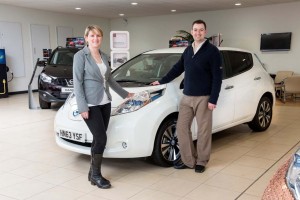Nissan has crossed a significant threshold becoming the first manufacturer to ever sell 100,000 plug-based vehicles.
Just over three years after launching the Nissan Leaf, the maker delivered the milestone battery sedan to a dentist in the British community of Fareham, about two hours southwest of London.
“I have chosen my Nissan Leaf because I am very interested in its running costs,” said Dr. Brett Garner, a father of three. “The cost of ownership such as maintenance, insurance and charging also convinced my wife. She had the experience of driving 500 miles in a borrowed LEAF and the low cost was remarkable. So she was converted and insisted that we had a Leaf.”
The Nissan Leaf was the first modern mainstream battery-electric vehicle and debuted in December 2010, about the same time rival General Motors launched the Chevrolet Volt plug-in electric vehicle. But while sales of the Volt have been sputtering in recent months, demand for the Leaf has been growing – in part due to price cuts in 2013, as well as expanded production, with the maker adding a second assembly line in Smyrna, Tennessee a year ago.
(Millennials want greener cars, reports new study. Click Herefor more.)
On the positive side, demand forbattery-based vehicles, in general, has been growing at a fair clip, particularly in the United States where conventional hybrid-electric vehicles gained 15% in 2013, reaching an all-time high of 500,000. Plug-based models, including both plug-in hybrids and pure battery-electric vehicles, or BEVs, gained 84% to come within a hairsbreadth of 100,000 for the first time ever.
BEVs alone were up a substantial 241% year-over-year, to 47,600, with the Nissan Leaf the industry’s best-seller at a total of 22,610. Second on the list was the newer Tesla Model S at 18,800.
(Strong demand for Model S meant big surge in Q4 earnings at Tesla. Click Here for the story.)
In the plug-in hybrid category, the Chevy Volt remained the market’s top-seller but at 23,094 sales were actually down almost 400 units from the year before.
Nissan appeared to benefit from a substantial price cut early in 2013 that, among other things, saw the introduction of a stripped-down entry model priced at $28,800 – before a federal tax credit of $7,500. Nissan recently announced a modest increase on the 2014 Leaf.
Price cuts have become a way of doing business in the battery-car segment which still accounted for less than 4% of the total U.S. market in 2013 including all forms of electrified propulsion such as hybrids, plug-ins and BEVs. Among the other makers who have trimmed costs are Toyota, Chevrolet, Ford and Honda.
But industry officials are hopeful that demand will increase as consumers become more familiar with the technology and as more models become available. A wide range of products have come to market for the 2014 model-year with even more scheduled in 2015.
And that covers a wide spectrum of the automotive market. Cadillac, for example, is about to launch its new ELR plug-in. Tesla is expected to begin producing a new battery-electric crossover, the Model X, later this year.
(Detroit Auto Show puts the emphasis on performance, rather than green machines. Click Here for the full story.)
Carlos Ghosn, the CEO of both Nissan and its French alliance partner Renault, has been one of the industry’s most active proponents of electric propulsion and the two makers have aggressive plans to expand their battery offerings. Later this year, Nissan plans to launch an electric light commercial vehicle, the e-NV200, in Europe.
The maker also will campaign its new ZEOD RC, an electric race car, at the grueling 24 Hours of Le Mans in June, hoping to not only set a track record but to highlight the capabilities of battery power.
That said, Nissan’s Infiniti division is backing down on its plans to bring out an upscale version of the Leaf, dubbed the LE. Citing the need to focus on conventionally powered performance models – as well as the current limits to battery range and performance – CEO Johan de Nysschen announced at the North American International Auto Show in Detroit last week that Infiniti won’t bring out a battery-electric vehicle until “late in the decade.”
(For more on Infiniti’s plans, Click Here.)


He might get quite a surprise on the total cost of ownership if he keeps his EV more than a couple years.
I’ll bet the EV car makers are selling a lot of new batteries with the arctic cold weather the U.S. is currently experiencing.